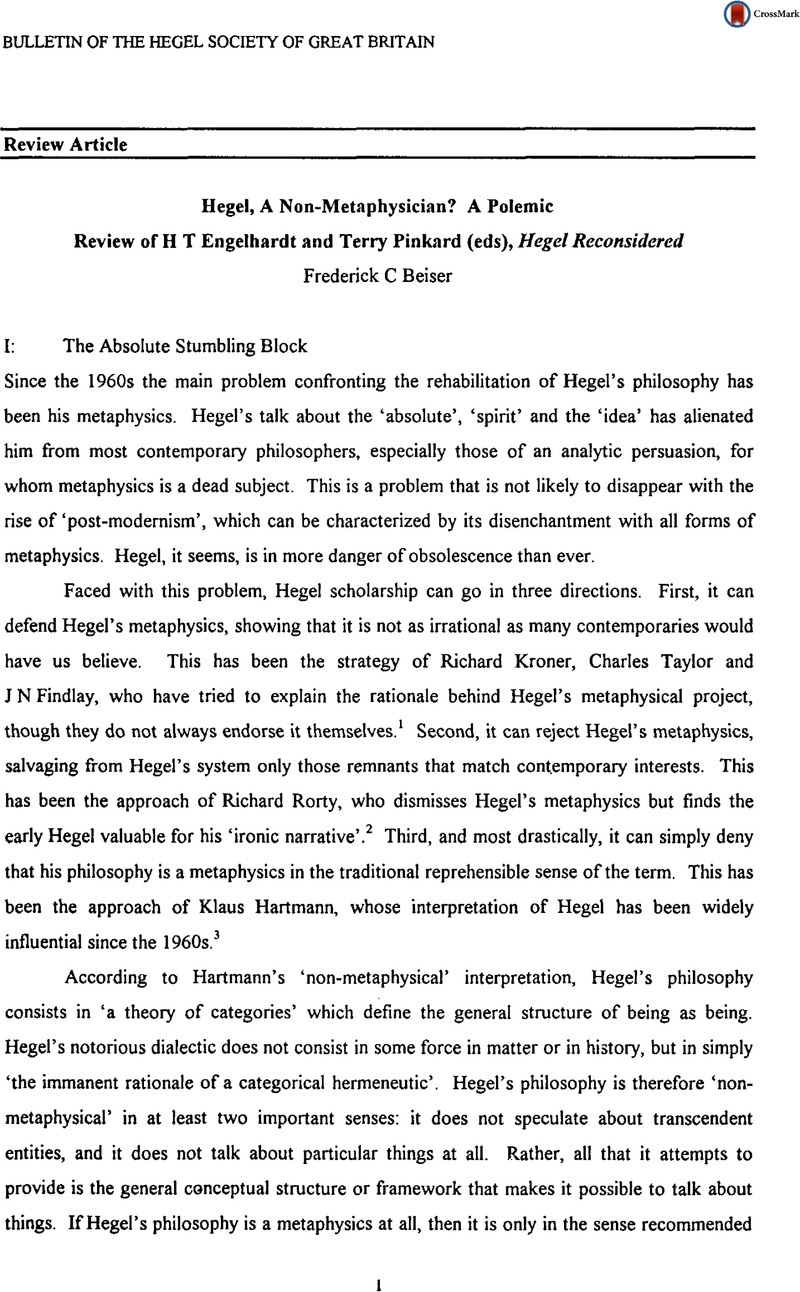Article contents
Hegel, A Non-Metaphysician? A Polemic Review of H T Engelhardt and Terry Pinkard (eds), Hegel Reconsidered
Published online by Cambridge University Press: 23 June 2015
Abstract

- Type
- Review Articles
- Information
- Bulletin of the Hegel Society of Great Britain , Volume 16 , Issue 2: number 32 , Autumn/Winter 1995 , pp. 1 - 13
- Copyright
- Copyright © The Hegel Society of Great Britain 1995
References
1 See Kroner, Richard, Von Kant bis Hegel (Tübingen: Mohr, 1921)Google Scholar; Taylor, Charles, Hegel (Cambridge: Cambridge University press, 1975)CrossRefGoogle Scholar, and Findlay, J N, Hegel: A Re-Examination (London: George, Allen & Unwin, 1958)Google Scholar.
2 Rorty, Richard, Contingency, Irony, and Solidarity (Cambridge: Cambridge University Press, 1989), pp 78–9CrossRefGoogle Scholar.
3 On Hartmann's writings on Hegel, see especially ‘Hegel: A Non-Metaphysical View’, in MacIntyre, Alasdair, ed Hegel: A Collection of Essays (Garden City, N J: Doubleday, 1971), pp 101–24Google Scholar; ‘Die ontologische Option’, in Die Ontologische Option (Berlin: de Gruyter, 1976), pp 1–31 CrossRefGoogle Scholar; and ‘On Taking the Transcendental Turn’, in Studies in Foundational Philosophy (Amsterdam: Rodopoi, 1988), 192–219 Google Scholar.
4 Hegel Reconsidered: Beyond Metaphysics and the Authoritarian State, edited by Engelhardt, H T and Pinkard, Terry (Dordrecht/Boston/London: Kluwer Academic Publishers, 1994), pp x + 258, Hb £73CrossRefGoogle Scholar.
5 Hegel Reconsidered, ‘Introduction’, p 1.
6 See Royce's Lectures on Modern Idealism. This is still one of the best introductions to the subject.
7 See Stern, Robert, ‘British Hegelianism: A Non-Metaphysical View?’, European Journal of Philosophy, 2 (1994), pp 293–321 CrossRefGoogle Scholar.
8 See the introduction by Engelhardt, p 1, and the article by Bole, Thomas J, ‘The Cogency of the Logic's Argumentation’, p 103 Google Scholar.
9 Hegel, , Sämtliche Werke, ed Glockner, H (Stuttgart: Frommann, 1927) I, 49 Google Scholar.
10 Ibid, IV, 24.
11 §84; Werke VIII, 201 Google Scholar.
12 In his lectures on the history of philosophy, Hegel said that Spinoza's substance is the starting point of philosophy. See Geschichte der Philosophie, Werke XIX, 376 Google Scholar.
13 Kritik der reinen Vernunft, B, 395.
14 Unfortunately, it is necessary to rely on Hartmann's students since Hartmann's own explanation of this problem is very obscure. See ‘Hegel: A Non-Metaphysical View’, in Studies in Foundational Philosophy, pp 281-2: “His [Hegel's] position on God and religion…is one that ‘places’ God and the religious congregation; it offers as their categorial account that unity of spirit which, as absolute, is not subject to plural…instantiation and thus transcends the real. The ontologist need not claim that God exists apart from the congregation forming a unity with them. The category would be sufficiently instanced by ‘religion’, a concrete universal leading up to, and surpassed by, philosophy”. The reader will want to know how God can be God if he does not exist apart from the congregation believing in his existence. This would make God into a regulative faith a la Kant and Fichte, which Hegel explicitly eschewed time and again in his Jena writings. Hartmann warns us, however, that his solution is “subtle”, so perhaps there are untold depths here which his students understand.
15 Cf pp 22-3, 105, 107, 114.
16 See Hartmann, , ‘Hegel: A Non-Metaphysical View’, pp 285–6Google Scholar. Cf. Bungay's and Khushf's comments on Hegel's philosophy of history, in Hegel Reconsidered, pp 36-7, 133.
17 See ‘Hegel: A Non-Metaphysical View’, pp 285-6.
18 Ibid, pp 281, 286.
- 9
- Cited by


